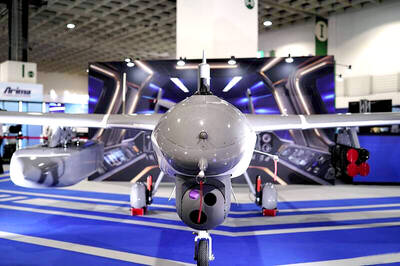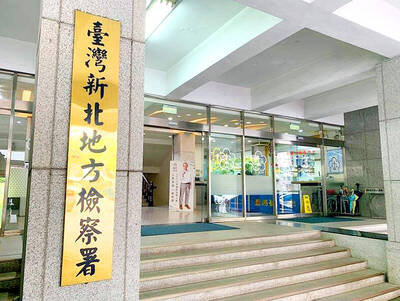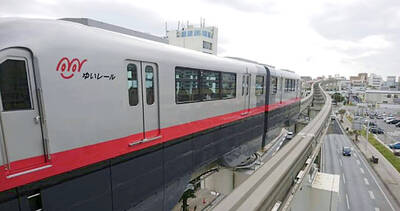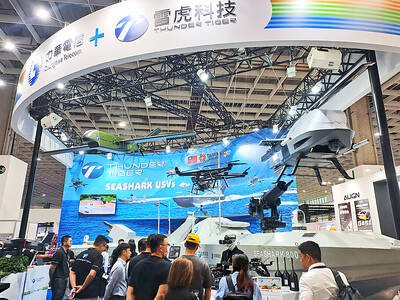Taiwan should impose semiconductor export controls as diplomatic leverage with precision to avoid a backlash, Institute for National Defense and Security Research analyst Lin Chia-yi (林佳宜) wrote in an article published on the institute’s Web site on Thursday.
The nation seems to be embracing “semiconductor diplomacy” as part of its policy tool kit, Lin wrote, after the government on Tuesday unveiled proposed restrictions on chip exports to South Africa over a dispute about its unilateral downgrading of Taiwan’s representative office in Pretoria.
Taiwan suspended implementation of the ban after Pretoria sought talks with the Ministry of Foreign Affairs over the matter.

Photo: Cheng I-hwa, AFP
Although Taiwan’s military capabilities are limited, its indispensable role in global supply chains for chips could be a deterrent, as semiconductor access is crucial to the economic well-being of many nations, Lin wrote.
South Africa imports chips from Taiwan and China, but Taiwan is the main supplier of advanced chips used in semiconductor manufacturing, data centers and artificial intelligence projects, she said.
Should the government’s efforts to put economic pressure on South Africa prove successful, Taiwan would likely embrace “semiconductor diplomacy” as a routine policy tool, she said.
However, Taipei should be careful in wielding chip export restrictions, as it could backfire by shocking global supply chains or the Taiwanese economy, she said.
Putting too much pressure on South Africa risks pushing it deeper into China’s camp to find an alternative source of semiconductors, Lin said.
Taiwan should limit bans on advanced semiconductor exports, as the administration of former US president Joe Biden did with China, she said.
Taiwan’s technology embargo on South Africa could be a game changer in the region’s geopolitics, as African nations seeking to build infrastructure and digitize their economy need semiconductors, she said.
African governments wanting access to Taiwanese chips would need to weigh the costs of their compliance with Beijing’s “one China” principle, she added.

SAFE SUPPLY: Drone shipments from Taiwan help Polish companies mitigate disruption from China, which scaled down its sales to European countries Poland has become the biggest buyer of drones from Taiwan as the eastern European country, on Russia’s doorstep, bolsters its defense capabilities and seeks to reduce reliance on Chinese parts. Poland is now absorbing almost 60 percent of Taiwan’s drone exports, which expanded this year to about US$32 million through last month, from almost nothing in the previous years. The next-largest importer of Taiwan’s drones is the US, to which Taiwan sold about US$7 million worth in the same period. Taiwanese drone maker Ahamani said Polish demand was so great it was planning to open a factory there, and that other foreign

The New Taipei District Prosecutors' Office yesterday indicted Luxshare Precision Industry Co chairwoman and CEO Grace Wang (王來春) and three others for contravening the Act Governing Relations Between the People of the Taiwan Area and the Mainland Area (臺灣地區與大陸地區人民關係條例). The billionaire businesswoman and cofounder of the China-based electronics manufacturer used a Hong Kong subsidiary in 2018 to acquire a division of Liteon Technology Co, a Taiwanese company, prosecutors said. Wang then sought to register it as an overseas Chinese-invested company, but was rejected by the Ministry of Economic Affairs' Investment Commission because its funding involved Chinese capital, prosecutors said. After the rejection, Wang

The Tainan Mass Rapid Transit (MRT) is to be a monorail, the first in Taiwan, the Tainan Bureau of Transportation said on Thursday last week. The Tainan City Government has submitted draft regulations governing the technical specifications of monorail systems to the Ministry of Transportation and Communications to handle the unprecedented project, the bureau said. Monorail designs are compact and quiet, fast to build, and have a small environmental footprint compared with the steel wheel and bogie design commonly used in Taiwanese cities, it said. Nations across the world operate monorail metro systems, and modern designs often feature separate walkways for maintenance crews

Taiwan is emerging as a regional hub for next-generation uncrewed systems, a security expert said yesterday, after a drone made by Taiwan’s Thunder Tiger Group was included in the US Department of Defense’s Blue UAS (uncrewed aerial systems) Cleared List. “Thunder Tiger’s Blue UAS certification is a milestone that signals Taiwan’s defense industry can now produce unmanned systems that meet the US Department of Defense’s strictest cybersecurity, supply chain and operational standards,” said Sunny Cheung (張崑陽), a fellow for China Studies at the Jamestown Foundation. On Saturday, Thunder Tiger’s Overkill, a first-person-view (FPV) suicide drone, became the first drone from